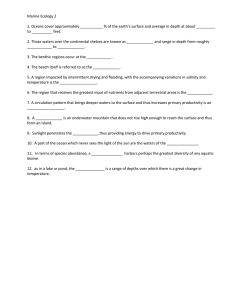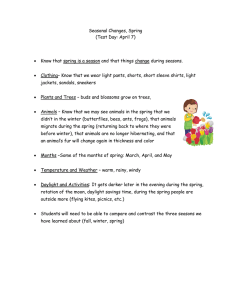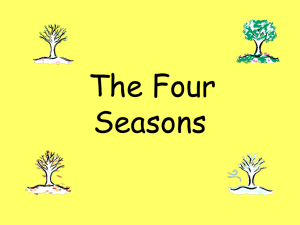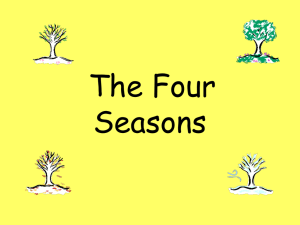Provided by The Internet Classics Archive. See - Rutgers
advertisement
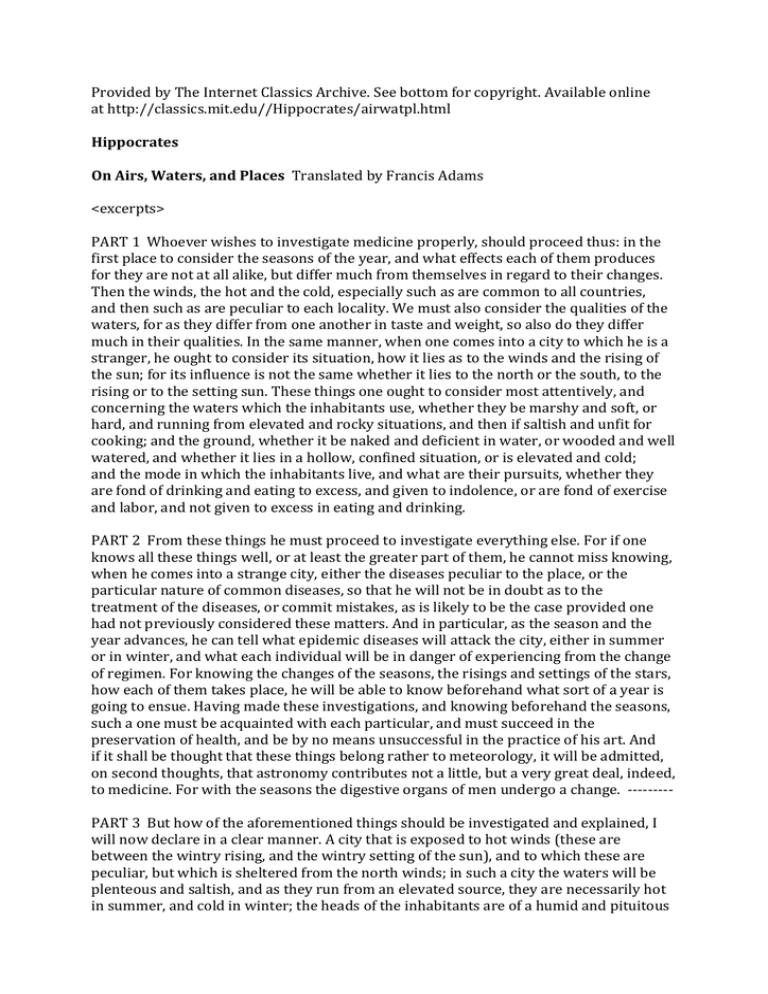
Provided by The Internet Classics Archive. See bottom for copyright. Available online at http://classics.mit.edu//Hippocrates/airwatpl.html Hippocrates On Airs, Waters, and Places Translated by Francis Adams <excerpts> PART 1 Whoever wishes to investigate medicine properly, should proceed thus: in the first place to consider the seasons of the year, and what effects each of them produces for they are not at all alike, but differ much from themselves in regard to their changes. Then the winds, the hot and the cold, especially such as are common to all countries, and then such as are peculiar to each locality. We must also consider the qualities of the waters, for as they differ from one another in taste and weight, so also do they differ much in their qualities. In the same manner, when one comes into a city to which he is a stranger, he ought to consider its situation, how it lies as to the winds and the rising of the sun; for its influence is not the same whether it lies to the north or the south, to the rising or to the setting sun. These things one ought to consider most attentively, and concerning the waters which the inhabitants use, whether they be marshy and soft, or hard, and running from elevated and rocky situations, and then if saltish and unfit for cooking; and the ground, whether it be naked and deficient in water, or wooded and well watered, and whether it lies in a hollow, confined situation, or is elevated and cold; and the mode in which the inhabitants live, and what are their pursuits, whether they are fond of drinking and eating to excess, and given to indolence, or are fond of exercise and labor, and not given to excess in eating and drinking. PART 2 From these things he must proceed to investigate everything else. For if one knows all these things well, or at least the greater part of them, he cannot miss knowing, when he comes into a strange city, either the diseases peculiar to the place, or the particular nature of common diseases, so that he will not be in doubt as to the treatment of the diseases, or commit mistakes, as is likely to be the case provided one had not previously considered these matters. And in particular, as the season and the year advances, he can tell what epidemic diseases will attack the city, either in summer or in winter, and what each individual will be in danger of experiencing from the change of regimen. For knowing the changes of the seasons, the risings and settings of the stars, how each of them takes place, he will be able to know beforehand what sort of a year is going to ensue. Having made these investigations, and knowing beforehand the seasons, such a one must be acquainted with each particular, and must succeed in the preservation of health, and be by no means unsuccessful in the practice of his art. And if it shall be thought that these things belong rather to meteorology, it will be admitted, on second thoughts, that astronomy contributes not a little, but a very great deal, indeed, to medicine. For with the seasons the digestive organs of men undergo a change. --------PART 3 But how of the aforementioned things should be investigated and explained, I will now declare in a clear manner. A city that is exposed to hot winds (these are between the wintry rising, and the wintry setting of the sun), and to which these are peculiar, but which is sheltered from the north winds; in such a city the waters will be plenteous and saltish, and as they run from an elevated source, they are necessarily hot in summer, and cold in winter; the heads of the inhabitants are of a humid and pituitous constitution, and their bellies subject to frequent disorders, owing to the phlegm running down from the head; the forms of their bodies, for the most part, are rather flabby; they do not eat nor drink much; drinking wine in particular, and more especially if carried to intoxication, is oppressive to them; and the following diseases are peculiar to the district: in the first place, the women are sickly and subject to excessive menstruation; then many are unfruitful from disease, and not from nature, and they have frequent miscarriages; infants are subject to attacks of convulsions and asthma, which they consider to be connected with infancy, and hold to be a sacred disease (epilepsy). The men are subject to attacks of dysentery, diarrhea, hepialus, chronic fevers in winter, of epinyctis, frequently, and of hemorrhoids about the anus. Pleurisies, peripneumonies, ardent fevers, and whatever diseases are reckoned acute, do not often occur, for such diseases are not apt to prevail where the bowels are loose. Ophthalmies occur of a humid character, but not of a serious nature, and of short duration, unless they attack epidemically from the change of the seasons. And when they pass their fiftieth year, defluxions supervening from the brain, render them paralytic when exposed suddently to strokes of the sun, or to cold. These diseases are endemic to them, and, moreover, if any epidemic disease connected with the change of the seasons, prevail, they are also liable to it. PART 4 But the following is the condition of cities which have the opposite exposure, namely, to cold winds, between the summer settings and the summer risings of the sun, and to which these winds are peculiar, and which are sheltered from the south and the hot breezes. In the first place the waters are, for the most part, hard cold. The men must necessarily be well braced and slender, and they must have the discharges downwards of the alimentary canal hard, and of difficult evacuation, while those upwards are more fluid, and rather bilious than pituitous. Their heads are sound and hard, and they are liable to burstings (of vessels?) for the most part. The diseases which prevail epidemically with them, are pleurisies, and those which are called acute diseases. This must be the case when the bowels are bound; and from any causes, many become affected with suppurations in the lungs, the cause of which is the tension of the body, and hardness of the bowels; for their dryness and the coldness of the water dispose them to ruptures (of vessels?). Such constitutions must be given to excess of eating, but not of drinking; for it is not possible to be gourmands and drunkards at the same time. Ophthalmies, too, at length supervene; these being of a hard and violent nature, and soon ending in rupture of the eyes; persons under thirty years of age are liable to severe bleedings at the nose in summer; attacks of epilepsy are rare but severe. Such people are likely to be rather long-lived; their ulcers are not attended with serious discharges, nor of a malignant character; in disposition they are rather ferocious than gentle. The diseases I have mentioned are peculiar to the men, and besides they are liable to any common complaint which may be prevailing from the changes of the seasons. But the women, in the first place, are of a hard constitution, from the waters being hard, indigestible, and cold; and their menstrual discharges are not regular, but in small quantity, and painful. Then they have difficult parturition, but are not very subject to abortions. And when they do bring forth children, they are unable to nurse them; for the hardness and indigestable nature of the water puts away their milk. Phthisis frequently supervenes after childbirth, for the efforts of it frequently bring on ruptures and strains. Children while still little are subject to dropsies in the testicle, which disappear as they grow older; in such a town they are late in attaining manhood. It is, as I have now stated, with regard to hot and cold winds and cities thus exposed. [...] PART 7 And I wish to give an account of the other kinds of waters, namely, of such as are wholesome and such as are unwholesome, and what bad and what good effects may be derived from water; for water contributes much towards health. Such waters then as are marshy, stagnant, and belong to lakes, are necessarily hot in summer, thick, and have a strong smell, since they have no current; but being constantly supplied by rain-water, and the sun heating them, they necessarily want their proper color, are unwholesome and form bile; in winter, they become congealed, cold, and muddy with the snow and ice, so that they are most apt to engender phlegm, and bring on hoarseness; those who drink them have large and obstructed spleens, their bellies are hard, emaciated, and hot; and their shoulders, collar-bones, and faces are emaciated; for their flesh is melted down and taken up by the spleen, and hence they are slender; such persons then are voracious and thirsty; their bellies are very dry both above and below, so that they require the strongest medicines. This disease is habitual to them both in summer and in winter, and in addition they are very subject to dropsies of a most fatal character; and in summer dysenteries, diarrheas, and protracted quartan fevers frequently seize them, and these diseases when prolonged dispose such constitutions to dropsies, and thus prove fatal. These are the diseases which attack them in summer; but in winter younger persons are liable to pneumonia, and maniacal affections; and older persons to ardent fevers, from hardness of the belly. Women are subject to oedema and leucophlegmasiae; when pregnant they have difficult deliveries; their infants are large and swelled, and then during nursing they become wasted and sickly, and the lochial discharge after parturition does not proceed properly with the women. The children are particularly subject to hernia, and adults to varices and ulcers on their legs, so that persons with such constitutions cannot be long-lived, but before the usual period they fall into a state of premature old age. And further, the women appear to be with child, and when the time of parturition arrives, the fulness of the belly disappears, and this happens from dropsy of the uterus. Such waters then I reckon bad for every purpose. The next to them in badness are those which have their fountains in rocks, so that they must necessarily be hard, or come from a soil which produces thermal waters, such as those having iron, copper, silver, gold, sulphur, alum, bitumen, or nitre (soda) in them; for all these are formed by the force of heat. Good waters cannot proceed from such a soil, but those that are hard and of a heating nature, difficult to pass by urine, and of difficult evacuation by the bowels. The best are those which flow from elevated grounds, and hills of earth; these are sweet, clear, and can bear a little wine; they are hot in summer and cold in winter, for such necessarily must be the waters from deep wells. But those are most to be commended which run to the rising of the sun, and especially to the summer sun; for such are necessarily more clear, fragrant, and light. But all such as are salty, crude, and harsh, are not good for drink. But there are certain constitutions and diseases with which such waters agree when drunk, as I will explain presently. Their characters are as follows: the best are such as have their fountains to the east; the next, those between the summer risings and settings of the sun, and especially those to the risings; and third, those between the summer and winter settings; but the worst are those to the south, and the parts between the winter rising and setting, and those to the south are very bad, but those to the north are better. They are to be used as follows: whoever is in good health and strength need not mind, but may always drink whatever is at hand. But whoever wishes to drink the most suitable for any disease, may accomplish his purpose by attending to the following directions: To persons whose bellies are hard and easily burnt up, the sweetest, the lightest, and the most limpid waters will be proper; but those persons whose bellies are soft, loose, and pituitous, should choose the hardest, those kinds that are most crude, and the saltiest, for thus will they be most readily dried up; for such waters as are adapted for boiling, and are of a very solvent nature, naturally loosen readily and melt down the bowels; but such as are intractable, hard, and by no means proper for boiling, these rather bind and dry up the bowels. People have deceived themselves with regard to salt waters, from inexperience, for they think these waters purgative, whereas they are the very reverse; for such waters are crude, and ill adapted for boiling, so that the belly is more likely to be bound up than loosened by them. And thus it is with regard to the waters of springs. [...] PART 16 And with regard to the pusillanimity and cowardice of the inhabitants, the principal reason the Asiatics are more unwarlike and of gentler disposition than the Europeans is, the nature of the seasons, which do not undergo any great changes either to heat or cold, or the like; for there is neither excitement of the understanding nor any strong change of the body whereby the temper might be ruffled and they be roused to inconsiderate emotion and passion, rather than living as they do always in the state. It is changes of all kinds which arouse understanding of mankind, and do not allow them to get into a torpid condition. For these reasons, it appears to me, the Asiatic race is feeble, and further, owing to their laws; for monarchy prevails in the greater part of Asia, and where men are not their own masters nor independent, but are the slaves of others, it is not a matter of consideration with them how they may acquire military discipline, but how they may seem not to be warlike, for the dangers are not equally shared, since they must serve as soldiers, perhaps endure fatigue, and die for their masters, far from their children, their wives, and other friends; and whatever noble and manly actions they may perform lead only to the aggrandizement of their masters, whilst the fruits which they reap are dangers and death; and, in addition to all this, the lands of such persons must be laid waste by the enemy and want of culture. Thus, then, if any one be naturally warlike and courageous, his disposition will be changed by the institutions. As a strong proof of all this, such Greeks or barbarians in Asia as are not under a despotic form of government, but are independent, and enjoy the fruits of their own labors, are of all others the most warlike; for these encounter dangers on their own account, bear the prizes of their own valor, and in like manner endure the punishment of their own cowardice. And you will find the Asiatics differing from one another, for some are better and others more dastardly; of these differences, as I stated before, the changes of the seasons are the cause. Thus it is with Asia. PART 17 In Europe there is a Scythian race, called Sauromatae, which inhabits the confines of the Palus Maeotis, and is different from all other races. Their women mount on horseback, use the bow, and throw the javelin from their horses, and fight with their enemies as long as they are virgins; and they do not lay aside their virginity until they kill three of their enemies, nor have any connection with men until they perform the sacrifices according to law. Whoever takes to herself a husband, gives up riding on horseback unless the necessity of a general expedition obliges her. They have no right breast; for while still of a tender age their mothers heat strongly a copper instrument constructed for this very purpose, and apply it to the right breast, which is burnt up, and its development being arrested, all the strength and fullness are determined to the right shoulder and arm. [...] PART 19 In respect of the seasons and figure of body, the Scythian race, like the Egyptian, have a uniformity of resemblance, different from all other nations; they are by no means prolific, and the wild beasts which are indigenous there are small in size and few in number, for the country lies under the Northern Bears, and the Rhiphaean mountains, whence the north wind blows; the sun comes very near to them only when in the summer solstice, and warms them but for a short period, and not strongly; and the winds blowing from the hot regions of the earth do not reach them, or but seldom, and with little force; but the winds from the north always blow, congealed, as they are, by the snow, ice, and much water, for these never leave the mountains, which are thereby rendered uninhabitable. A thick fog covers the plains during the day, and amidst it they live, so that winter may be said to be always present with them; or, if they have summer, it is only for a few days, and the heat is not very strong. Their plains are high-lying and naked, not crowned with mountains, but extending upwards under the Northern Bears. The wild beasts there are not large, but such as can be sheltered underground; for the cold of winter and the barrenness of the country prevent their growth, and because they have no covert nor shelter. The changes of the seasons, too, are not great nor violent, for, in fact, they change gradually; and therefore their figures resemble one another, as they all equally use the same food, and the same clothing summer and winter, respiring a humid and dense atmosphere, and drinking water from snow and ice; neither do they make any laborious exertions, for neither body nor mind is capable of enduring fatigue when the changes of the seasons are not great. For these reasons their shapes are gross and fleshy, with ill-marked joints, of a humid temperament, and deficient in tone: the internal cavities, and especially those of the intestines, are full of humors; for the belly cannot possibly be dry in such a country, with such a constitution and in such a climate; but owing to their fat, and the absence of hairs from their bodies, their shapes resemble one another, the males being all alike, and so also with the women; for the seasons being of a uniform temperature, no corruption or deterioration takes place in the concretion of the semen, unless from some violent cause, or from disease likewise all the other productions of the earth corresponding to the earth itself. Thus it is with regard to the most opposite natures and shapes; drawing conclusions from them, you may judge of the rest without any risk of error. [...] Aristotle: Politics, VII, 1327b About the citizen population, we said before what is its proper limit of numbers. Let us now speak [20] of what ought to be the citizens' natural character. Now this one might almost discern by looking at the famous cities of Greece and by observing how the whole inhabited world is divided up among the nations. The nations inhabiting the cold places and those of Europe are full of spirit but somewhat deficient in intelligence and skill, so that they continue comparatively free, but lacking in political organization and capacity to rule their neighbors. The peoples of Asia on the other hand are intelligent and skillful in temperament, but lack spirit, so that they are in continuous subjection and slavery. But the Greek race participates in both characters, just as it occupies the middle position geographically, for it is both spirited and intelligent; hence it continues to be free and to have very good political institutions, and to be capable of ruling all mankind if it attains constitutional unity. The same diversity also exists among the Greek races compared with one another: some have a one-sided nature, others are happily blended in regard to both these capacities. It is clear therefore that people that are to be easily guided to virtue by the lawgiver must be both intellectual and spirited in their nature. For as to what is said by certain persons about the character that should belong to their Guardians4—they should be affectionate to their friends but fierce towards strangers—it is spirit that causes affectionateness, for spirit is the capacity of the soul whereby we love.
